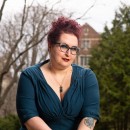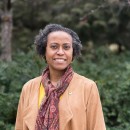School of Social Work News
Pages
- Two alumni honored with SSW Distinguished Alumni Awards
The Distinguished Alumni Award recognizes School of Social Work alumni whose achievements exemplify the values of the School of Social Work and who have made an exceptional impact on the profession, the community and/or Social Work education.
- May 1, 2021
- U-M Community Outreach to Support the COVID-19 Crisis in India
In recent weeks, the number of COVID-19 cases in India has exploded, overwhelming the nation’s public health, medical and infrastructure capacities, and creating a health care catastrophe.
The U-M Community has close ties to India that go back over a century, resulting in cherished long term research and educational partnerships. We currently have about 1,000 students from and 6,000 alumni in India, many of whom are personally affected by this unfolding crisis.
How you can help:
- Give to the American India Foundation’s COVID Response Fund. Entering “University of Michigan” in the comment box will ensure that your gift is recognized as part of the U-M community’s effort to assist at this critically important time.
- Take five min to call Congress and ask them to encourage and support measures that would increase vaccination rates in India.
We know many of you with family or friends in India are suffering. Please do not hesitate to reach out to access university support resources if you need help during such a difficult time. Our Counseling and Psychological Services (CAPS) are available to all students.
- U-M Counseling and Psychological Services CAPS resources are shared with students and listed in the MSW News. Alejandro Rojas, MSW, is the CAPS embedded counselor with the School of Social Work,. You can reach him by phone at (734) 763-7894 or [email protected].
- Our Faculty and Staff Counseling and Consultation Office is open and available to provide support to U-M faculty and staff on the Ann Arbor.
- April 30, 2021
 Shanna Kattari Quoted in USA Today About Celebrities Teaching Kids To Be More Inclusive
Shanna Kattari Quoted in USA Today About Celebrities Teaching Kids To Be More InclusiveShanna Kattari is quoted in USA Today in an article about celebrities teaching kids to be more inclusive. "Gabrielle Union and Dwyane Wade were so supportive of Zaya coming out and really did a lot of work above and beyond just supporting her, but really making sure other people understood the importance of family support," says Kattari.
- April 29, 2021
- Learn more »
 College Savings Accounts Help Low-Income Children Build Assets
College Savings Accounts Help Low-Income Children Build AssetsProfessor William Elliott III spoke with the New York Times about how establishing college savings accounts early transforms expectations about the future and impacts savings. “A savings account for a low-income kid means a lot more to them than it does for a wealthy kid.”
- April 28, 2021
- Learn more »
- Advisory Committee Begins Search for New Dean
The advisory committee includes faculty, staff, students and other members of the U-Community. The committee is looking for a replacement for Lynn Videka who will step down as dean on December 31, 2021. Read the full story in The University Record.
- April 21, 2021
- Learn more »
- Derek Chauvin Found Guilty of Murdering George Floyd
The jury has found Derek Chauvin guilty on all counts.
The jury has found Derek Chauvin guilty of second-degree murder in the death of George Floyd.
The jury has found Derek Chauvin guilty of third-degree murder in the death of George Floyd.
The jury has found Derek Chauvin of manslaughter in the death of George Floyd.Read the university’s response to the verdict in the trial of Derek Chauvin.
- April 20, 2021
- Designing Access Finalist in the U-M Envisioning an Anti-Racist World Challenge
On April 9, five MSW students, Sofie Aaron, Amy Belfer, Flavio Di Stefano, Hannah Lefton and Callie Torkelson, showcased Designing Access, a resource they created to promote the creation of events that are inclusive and welcoming to all. Their design was part of the Envisioning an Anti-Racist World Challenge, in partnership with the U-M Office of Diversity, Equity and Inclusion.
Designing Access was one of seven presentations at the virtual showcase. Participants were able to create an avatar and enter virtual rooms to experience the presentations. The team was awarded $1,000 in recognition of their innovative approach to creating a future world that is anti-racist.
The team was initially brought together by Clinical Assistant Professor Katie Doyle. The original project idea started as a class project with the insight that someone developing an event could use the DEI Checklist as a tool for ensuring that any event was fully accessible. The website takes users through the entire event planning process and provides resources for them, right on the website, to help them tackle the relevant planning questions.
Hannah Lefton, a Designing Access team member, remarked, “A big challenge of using technology to increase accessibility is that technology is not always accessible. There are a lot of pitfalls one can hit when trying to make a website (or any technology) accessible. But, our team also thinks technology can be used intentionally to make resources much more accessible. It's just a matter of putting in the time and effort to make it that way. As social work students, the Designing Access team was happy to put in that time and energy, because we know that creating more accessible spaces is an important goal.”
The team worked hard to create an online toolkit that can be used by anyone. They hope it will become a resource for event planners, teachers, administrators, nonprofits, small businesses, for-profit enterprises and even individuals who are interested in making casual social gatherings more accessible.
- April 15, 2021
- Learn more »
- Angela Fernandez Named a William T. Grant AQC Scholar
Postdoctoral Research Fellow Angela Fernandez has been selected as a William T. Grant AQC Scholar with the Institute in Critical Quantitative, Computational & Mixed Methodologies. The institute’s mission is to advance the presence of scholars of color among those using data science methodologies, and challenge researchers to use those methods in ways that can dismantle the structural barriers to enable human flourishing for underrepresented communities, professionals, and young people.
- April 14, 2021
- Learn more »
- How Can We End the Cycle of Police Violence?
The tragic loss of Daunte Wright, a 20-year-old Black man killed by police during a traffic stop in Brooklyn Center, Minnesota fills our community with pain, fear and anger. Day-to-day interactions, like traffic stops, put Black members of our community lives at risk every day. Each incident of injustice is a dark reminder of the amount of work to dismantle systemic racism and oppression in our law enforcement and in society.
- April 13, 2021
 Trina Shanks Interviewed About Research on Vaccine Hesitant Groups
Trina Shanks Interviewed About Research on Vaccine Hesitant GroupsProfessor Trina Shanks was interviewed by West Michigan Fox Channel 17 about vaccine hesitant groups she has been researching. Shanks survey shows that over 50 percent of Detroiters intend to get the vaccine. “There’s people who literally said, 'I don’t want to take it' in December, but when the opportunity came, they did get the vaccine,” Shanks said.
- April 13, 2021
- Learn more »